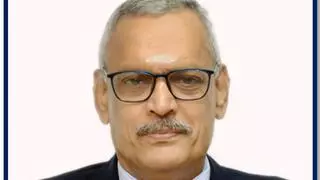In the next 18 months, the National Curriculum Framework for the 5+3+3+4 system Y— that will replace the traditional 10+2 schooling system — will come up. Textbooks will accordingly be developed by the National Council of Educational Research and Training, and the framework will be shared with the States, said Sanjay Kumar, Secretary, School Education, Ministry of Education, Government of India.
As per the 5+3+3+4 system under the National Education Policy 2020, the children will spend five years in the foundational stage; three years in the preparatory stage; three years in the middle stage and four years in the secondary stage.
As per the NEP, a new National Curriculum Framework — a comprehensive framework to guide the development of education in the country — is being developed. As per the framework, all the books will be rewritten to reflect the spirit that is part of the NEP. “We have already come out with the teaching learning material for three years of preschool and classes 1 and 2. It should be launched soon in Delhi. We will send the framework to State Council of Educational Research and Training in all the States, and they will be requested to look at it and customise it as per their needs,” he told newspersons.
Teachers’ education is extremely important. The online platform NISHTA — a capacity-building programme for improving the quality of school education through integrated teacher training - is used to train teachers. Similarly, the NEP talks about Integrated Teachers Educational Programme wherein the various B.Ed programmes of two or three years, there will be a single B.Ed programme across the country of four years duration by 2030.
“Only when we have the best teachers, only then will we be able to achieve the best outcomes,” he said at the end of the First G20 Education Working Group Meeting on ‘The Role of Digital Technologies in Education’ on Tuesday.
The Education Working Group, under India’s Presidency of G20, has a key objective to identify areas/themes to promote possible research and academic collaboration among educational institutions in G20 member countries.
Asked for the timeline of an action plan based on the outcomes of the meetings, K Sanjay Murthy, Secretary, Department of Higher Education, Ministry of Education, said at Chennai the first working group meeting is being held, and this will be followed at Bhubaneswar, Amritsar and Pune. At the final meeting in Pune, the Ministerial meeting will happen and the final outcomes of the deliberations of the meetings will be agreed, which will in turn feed in to the Presidential Declaration in September.
While the Chennai meeting was on technology-enabled learning, the meeting at Amritsar will be research and richer collaboration; a whole day seminar on skill and future at work will be discussed at Bhubaneshwar and foundational literacy and numeracy at Pune, he said.








Comments
Comments have to be in English, and in full sentences. They cannot be abusive or personal. Please abide by our community guidelines for posting your comments.
We have migrated to a new commenting platform. If you are already a registered user of TheHindu Businessline and logged in, you may continue to engage with our articles. If you do not have an account please register and login to post comments. Users can access their older comments by logging into their accounts on Vuukle.